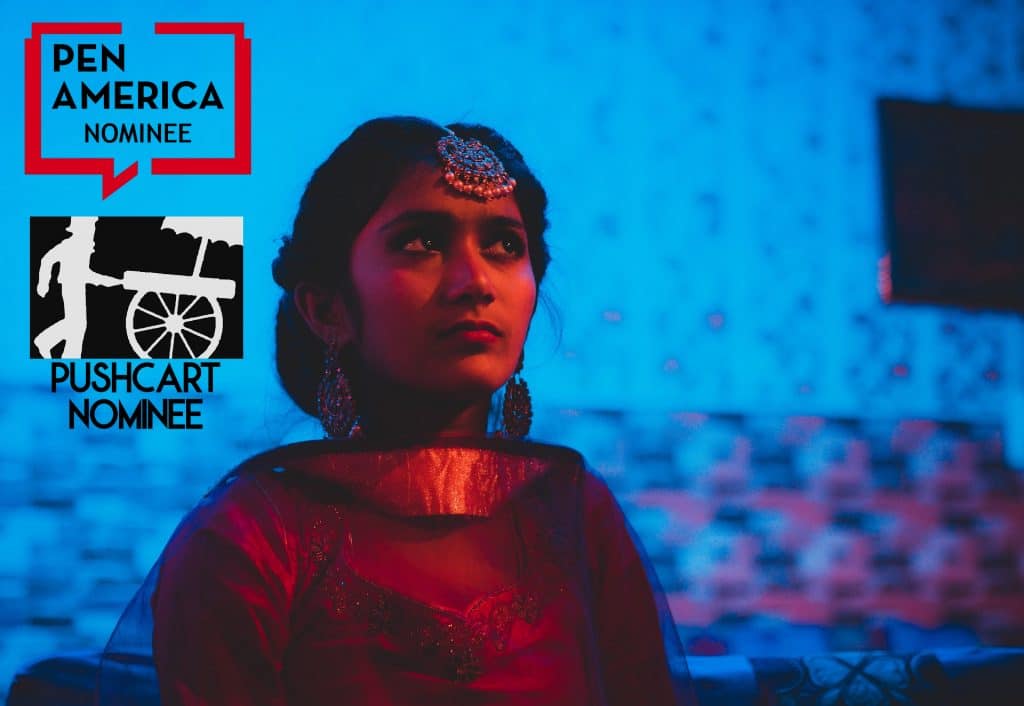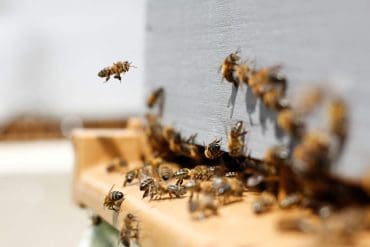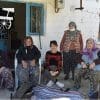The Challenges of Being a Woman in Bangladesh: Asha’s Story
I wrote Asha’s story to give voice to all the women in rural Bangladesh who cannot speak out against their abusers or society. They find comfort and strength in their everyday lives and draw strength from each other. There is such a vast difference in the way women in the villages see themselves versus the women who live and grow up in the cities. Educational disparity, cultural differences and poverty play a key role in keeping this gap wide between the women in the cities and villages. But there are small changes that are slowly taking place and I felt that by giving Asha her own story I was sharing her voice with others.
 |  |
Author’s Memo
“Asha” was a hard story to write as it is about a woman who came from the village to work for my mother. I would spend time with her and others who would come to work in the city. Whenever I would visit my mother, I would meet these women, who were so shy and different from the women in the cities. They would talk and chat about their lives, their losses and their dreams. As they came from rural Bangladesh they were truly under the shackles of their fathers, brothers or husbands. The law was too far away to be taken seriously so each of these villages had their own laws. As one can imagine the roles of women were one of domesticity and obedience.
Asha’s story is about a woman who grew up in rural Bangladesh. She was married off at a very young age. Gradually she settled in her role of wife and daughter-in-law. She developed the love for learning and reading, but her dreams were shattered as her husband and in laws push her to have children. She realizes that perhaps she cannot have children and this acts as a catalyst for her mother-in-law to convinces Asha’s husband to marry another woman. Asha runs away to the city to become financially independent and to realize her strength and independence. She realizes that she can be happy with herself in her own terms.
I wrote Asha’s story to give voice to all the women in rural Bangladesh who cannot speak out against their abusers or society. They find comfort and strength in their everyday lives and draw strength from each other. There is such a vast difference in the way women in the villages see themselves versus the women who live and grow up in the cities. Educational disparity, cultural differences and poverty play a key role in keeping this gap wide between the women in the cities and villages. But there are small changes that are slowly taking place and I felt that by giving Asha her own story I was sharing her voice with others.

Chapter 1
Asha’s mother sighed. She was a slim, dark woman whose face was covered in dark patches where she had been burnt from the sun. She always put kajol (kohl) under her eyes. They were misted now, “You have no choice in this matter. Your Abba has decided. You have become a woman and it is our duty to get you married. The age difference is normal in the village and you know we can’t continue to feed so many children. Your father is becoming old. You have to do this for him, for us.”
She was tying a red knot around the pillar. Her brow was glistening with sweat. She tried hard to concentrate and prayed to the holy men and Allah to grant her wish. After tying the knot, she wiped her brow with the end of her garment and fixed her ghumta (head covering). She wore her red and blue printed sari in a single twirl, unlike the pleated manner of those from the city. She was dark; some said that she was dark like the coals. Her eyes were small in a background of white. She was plump in shape and short of height. Her joy was cooking and making pithas. As she turned to leave, she prayed that she had been able to tie the knot properly. Sweat dripped again from her forehead and now covered her round face. She quickly made her way home.
It was said that if one tied the knot and prayed, all one’s wishes came true. Asha truly wished that her prayers would be answered. She started to think of her life. She had been born and raised in a small village in Mymensingh, where the most amazing thing to have happened was the arrival of cable TV and electricity in all the houses. It was a peaceful community. Her father had a small boat and he would go into the river and fish all day. During the dry season when the water would drop, her father would sell vegetables or homemade cheese, the kind that was white and pungent but salty to taste, and made from the milk of the cows that grazed all day.
At night, she recalled that her family would sit outside and eat under the shade of the sky. They would sit on the cold mud using plates made of tin. Those days, she was young and care free. Her brother and she would play all day in the scorching heat, which only lessened during winter time. The world would become covered in mist and a cool breeze would blow through their small hut. There were only three rooms, each separated by a flimsy barrier, made of leaf and straw. The hut was made of thicker straw and the ground and walls were made of mud. During the heat, the mud floors made their hut cool. Their toilet was outside and was a squatting one. Only recently her father had been able to install a flush, which she still found confusing. But she no longer lived there. She had not lived with them since she was sixteen. But they were neighbors, her in-laws and her parents.
As her bare foot, dark and dusty, traced the steps back to her husband’s home, her thoughts drifted to that sunny day during winter, right after she had turned sixteen. She had been playing outside with her younger sister. She was the eldest of the three girls and a brother. Her mother had pulled her aside and told her to quickly put on a sari. Asha had been confused. She knew she was growing up; she had gotten her periods recently and her mother had told her it was a sign that she was becoming a woman. She was still wearing her traditional shalwar kameez clothing, so this request to wear a sari seemed odd. Still, she changed and giggled as she tried to wrap herself in it. She looked at the small mirror, in the small cramped room, which she shared with her siblings. Her face looked plain and she stuck out her tongue and giggled. As she came out of the room, her mother grabbed her, “Some people have come to see you. We are talking about your marriage with Halim from next door. You can’t remain a child forever.”
Asha’s smile froze and her heart hammered, “But Ma, I don’t want to get married. Not to anyone, especially Halim, he is so old. Please Ma, please tell Abba (Father) not to get me married. I promise I will be good. I will bring water from the well every day. I will help you more around the house.”
Asha’s mother sighed. She was a slim, dark woman whose face was covered in dark patches where she had been burnt from the sun. She always put kajol (kohl) under her eyes. They were misted now, “You have no choice in this matter. Your Abba has decided. You have become a woman and it is our duty to get you married. The age difference is normal in the village and you know we can’t continue to feed so many children. Your father is becoming old. You have to do this for him, for us.”
“Tahera, your daughter is quite dark. I had forgotten how dark she is. How can I hope for fair grandchildren when my daughter-in law is so dark? I think it’s only fair that along with the 20,000 takas, you give us a new TV. I mean, who will marry your daughter? She isn’t pretty, you know.”
“I can work. I can help with chopping and some of the neighbors might pay for an extra hand during harvest time.”
“It’s no use, Asha; how long can you avoid the inevitable? You know the villagers will not give a young, marriageable person work.”
Asha had no choice. She went in front of her neighbors wearing a sari and listened to the chatter between her future father-in-law and her own father. Everyone ignored her, only her would-be mother-in-law, whom she would have to call Amma, came and sat next to her. She made her turn her face and examined it closely.
“Tahera, your daughter is quite dark. I had forgotten how dark she is. How can I hope for fair grandchildren when my daughter-in law is so dark? I think it’s only fair that along with the 20,000 takas, you give us a new TV. I mean, who will marry your daughter? She isn’t pretty, you know.”
The men turned towards her and Asha felt embarrassed and ashamed as eight pairs of eyes examined her. She felt as though her parents were looking at her for the first time. She wanted to tell them that her complexion was just like theirs, but she was unable to do so and looked down at the ground and tried to block out all thoughts from her mind.
That night she overheard her parents in the next room about how they would be putting all their savings towards the wedding. She knew it was pointless saying anything to them. She had tried again and again and failed. Her parents were adamant that she should get married. The wedding was to be held in a week’s time. Asha tried to convince her mother. Failing there, she finally approached her father.
“It is useless, Asha, to argue. Do you want me to live with the shame that I have a grown daughter who is not married? I want you to get married, to look after your in-laws and to have children.”
“But I feel I am a child myself.”
“Don’t be silly,” said her father whose hair was graying and whose once firm body was becoming relaxed with age. “You are old enough to get married. Now, enough; no more.”
“I went to school till grade ten. I was supposed to take the metric exam, but Abba didn’t allow. He said a farmer didn’t need to know so much. I still read a few books here and there. If you want to learn I can teach you.” “Yes, please,” said Asha pulling back her ghumta.
Asha ran away to the rice fields crying, realizing it was useless. From then on, Asha would get up every day and instead of playing outside on the vast green rice fields or swimming in the pond where the water danced with the sun, she would sit next to the well and look below its deep, dark bottom wondering if she had the courage to take her life. But each day she would turn around and go back. She would then sit on the front porch where the cool mud would seep into her legs, and watch the ducks waddle and the chickens quack, feeling that even they had more meaning in their lives; at least they were helping feed those who were hungry.
What was her purpose for existence? Marriage and then what? Why Halim? He was an average built man who had cold eyes. His face always had a frown and his hands were very skinny for a grown man. Every time she thought of him, she felt worse. But nothing she said or did changed the minds of the adults. They were set on her marriage, even her friends who were her age said that she was lucky to be getting married; their parents were not able to find anyone suitable for them. But Asha wanted to tell them that she felt she was still young, she wanted to play and study and sleep on her mother’s lap on hot summer days. But no one paid attention to her.
Finally, the day dawned and Asha found herself married and in the presence of Halim. Her mother had tried to explain her duties and Asha had cringed at the thought that a stranger was to touch her so intimately. She tried to hold on to the nausea that overcame her. As she sat on the bed with the sari hiding her face, as was the custom of the village bride, she heard him fumbling around. Then he came and sat next to her, a man who was almost fifteen years older than her. She pulled her legs towards her stomach and became even more hunched hiding her face behind her sari. Halim coughed and said, “I know we don’t know each other, but maybe, slowly, we can try. You’ll find that if you listen to my mother, you will have no problems. I am usually busy with my father helping him with the rice field and then the vegetable field. I am usually not home till after sunset. Once I have helped my father enough, he will give me a portion of the land and then I will be more financially independent, till then I have to depend on my parents. So, you must please my parents, especially my mother, at all cost.”
Asha dared to peek out of her ghumta and cleared her throat. Taking great gulps of air she asked timidly, “How come you are so well spoken? I have a hard time forming the correct words that I think in my mind.”
“I went to school till grade ten. I was supposed to take the metric exam, but Abba didn’t allow. He said a farmer didn’t need to know so much. I still read a few books here and there. If you want to learn I can teach you.”
“Yes, please,” said Asha pulling back her ghumta. Halim smiled and brought out a book with pictures of the sun and stars from under the wooden bed. The room was in the dark except for the light from the candles and the lantern. It was made of bamboo and had no decoration. The only furniture was the bed, a study table and chair. The floor was made of mud and the two sat huddled on the bed. Halim and Asha talked about the book which showed how the earth went around the sun. Asha looked into Halim’s eyes, while he explained and realized that his eyes were not cold, but weary. She wondered why. In this manner the two became comfortable with each other before they became intimate.
At night she would ask Halim, “Will you teach me how to write full sentences?” Halim would laugh quietly, pull her closely and say, “Why are you interested in learning? I only read so that I might one day be able to use this knowledge for my fields. But you don’t need to learn. You only need to keep the house running and keep my mother happy.”
Chapter 2
Asha hurried forward and tried to block out the images from her head. There was hardly any time left. Tears rolled down her face and she hurried home. Those had been the days; she was young and Halim and her had sat and talked and laughed at night in the privacy of their small room. These days things were different. Allah knew she had tried to fix things. She remembered how hard she had tried.
She had to always make sure that her ghumta was in place, that her mother-in-law was always pleased with her. She would wake up with the crows, sweep the little room that was the kitchen; light the little mud made ovens, which she heated with twigs and then she would start to cook breakfast which consisted of rice and dal. After serving breakfast to everyone, she would have to prepare lunch, listen to her mother-in-law in between, take lunch out to the rice field and then prepare dinner. Her work was nonstop, so whenever her Amma complained she tried not to pay too much attention, for the nights when she was alone with Halim were the ones she cherished and which kept her going. Halim kept on reminding her that she needed to be good to his parents so they would give him the rice paddy land which he desperately wanted.
He had many modern ideas, but none of them would work if he had no land of his own. So, Asha toiled, hardly visiting her mother or her siblings, living solely for Halim’s dream and secretly her dream of learning. She knew her handwriting was getting better and she could read better, but she wanted to learn English. Her friend Ameena knew a little English and worked in Dhaka city. She worked as a maid in a house and she had told Asha that learning English was very helpful. Not that she ever dreamed of working in Dhaka; still, one never knew.
At night she would ask Halim, “Will you teach me how to write full sentences?”
Halim would laugh quietly, pull her closely and say, “Why are you interested in learning? I only read so that I might one day be able to use this knowledge for my fields. But you don’t need to learn. You only need to keep the house running and keep my mother happy.”
“I do try to keep her happy, but it’s not always easy. But I will try harder. Will you teach me please? Learning makes me feel I have something of my own, it gives me something to long forward to.”
Halim looked at her and stared at her. He reached and pulled her hair and started twirling it in his hands, “You sound like a man when you say all this, but I will teach you. Then, maybe, you will be able to teach my children and then they can help me with my work.”
Asha kept quiet and wondered why he was in a strange mood, but decided to ignore it and let him twirl her hair as he taught her the words and the alphabet that formed the words.
“You know that all the villagers talk about me,” said Halim. “They think I am unable to produce children. Soon they will question my manhood. You must give me a son otherwise I will never inherit anything and the whole village will shame me. I don’t want to see a doctor as there is nothing wrong with me. You probably have a problem.”
In this manner, Asha’s days and nights passed; her days were busy with grueling physical work and her nights were spent learning and practicing reading. But months passed and soon she had been married almost six years on the day her world changed.
She remembered she was blowing on the mud-made oven. She was rushing to finish her cooking. She heard her mother had come over for a visit. A rare occasion. She had brought with her pithas, sweets, all made by her hands. She gave them to Asha’s mother-in-law. Her mother-in-law took them ungraciously and lay them on the ground. She then frowned and asked Tahera to sit down. Asha saw the look her mother gave her and her heart missed a beat. She knew that something was about to happen.
“Tahera, when you gave your daughter to our house you did not say that she was infertile.”
Asha dropped the twigs and ran out to her mother.
“Amma, what are you saying? Halim and I have been married for such a short time, and there is no need to tell my mother all this.”
“Shut up you beyadob (rude) girl. I will say whatever I want. It’s the truth, a young girl like you, why aren’t you pregnant yet? I should have known by the first year, but like a fool I kept on waiting. Now I will wait no more. I will get my son married again. Either you give me a grandson or I will get my son married. I only have two children, my daughter and my son. My daughter already has two children, now I want to see my son’s child. You people weren’t able to even give us the TV we demanded and now this; an infertile, dark girl.”
“Amma please, please don’t say all this to my mother.”
“I will say and do as I please. Who are you?” Her mother- in- law had a brownish complexion. She was thin and her enormous black eyes which made her look fierce were glowing with rage. She spat the words out and turned and went inside. Asha ran to her mother and cried; her mother too began to cry. That night Asha told her husband about what his mother had said. He was lying on the small, hard bed and stared at the low ceiling made of bamboo. His silence made Asha’ s heart shake and she rubbed her mouth which was stained red with pan leaves.
She wiped her hands and asked, “Well, what do you think? Should we show a doctor or should I go to pir/fakir (spiritual guide) and get some prayers and blessings?”
“You know that all the villagers talk about me,” said Halim. “They think I am unable to produce children. Soon they will question my manhood. You must give me a son otherwise I will never inherit anything and the whole village will shame me. I don’t want to see a doctor as there is nothing wrong with me. You probably have a problem.”
Her mother turned to the old one and told her about how her daughter was trying for a child and how if she didn’t have a son, and soon, she would lose her husband. After some time, her mother kept quiet. The old one was looking ahead and was quiet for so long that Asha began to wonder if she had fallen asleep.
Chapter 3
Halim was lying on his side and he did not turn to face Asha. She stared at him, hoping he would look at her so that she could read his feelings, but he did not turn. She wondered how he could talk like this. He was supposed to be an educated man; or so she had thought. She got up and left the small room. She went to the open yard in the front and sat on the solid cold mud floor and looked up at the clear sky with its twinkles. She prayed fervently and hoped she could bear children, especially a son. In the village, only a son could carry a man’s name; a daughter was of no use and dowry had to be given when she got married. So, a son was always preferred.
The next day, she went out quietly in the afternoon. She went to her parents’ house and whispered to her mother where she wanted to go. Her mother looked at her with fear, but understood. The two of them placed their ghumtas with their saris and walked and walked. They passed endless landmarks which divided vegetable and rice fields. Occasionally, they passed small ponds where someone or other was trying to catch the silver fish prancing in the water. The rakhals (farmers) sat under the shade and played their flutes; its music travelled and spoke of broken dreams and broken hearts. The two paid no attention to the wild baili flowers and the butterflies which went in search of honey; neither did they listen to the warnings of crows or the music of the birds. They travelled quietly and quickly until finally they arrived in front of a small hut.
The dwelling was broken down, the roof looked like it needed repair and the mud was cracked. They stood outside and called out saying that they had come to visit Pir Ma. An old and shrivelled woman came out dressed in white with hair that was threaded with silver. Her eyes were a deep black and there was a radiance in her face; although it was folded with wrinkles. She walked slowly and sat down on the bench outside and signaled them to sit. They bade their salaams and sat by her feet; sitting above her might be a sign of rudeness. Asha kept her eyes averted; only sneaking a peek when she felt it was safe. Her mother turned to the old one and told her about how her daughter was trying for a child and how if she didn’t have a son, and soon, she would lose her husband. After some time, her mother kept quiet. The old one was looking ahead and was quiet for so long that Asha began to wonder if she had fallen asleep.
“Unfortunately, child, you have a problem and it’s not curable. I will give you some water which has healing properties, but there is no guarantee. You should pray. If the Almighty wishes it, you will have a child. But, if it’s not in your fate, what can you do? But you must be careful because your mother–in-law is already planning a replacement in your place.”
Finally, she spoke in a clear, soft voice, “Unfortunately, child, you have a problem and it’s not curable. I will give you some water which has healing properties, but there is no guarantee. You should pray. If the Almighty wishes it, you will have a child. But, if it’s not in your fate, what can you do? But you must be careful because your mother–in-law is already planning a replacement in your place.”
Asha felt frightened, her heart gave a tight squeeze. She wanted to tell the Pir she was wrong, but she didn’t dare. She kept her eyes on the ground. The rest of the conversation was a blur; Asha kept on thinking about what the Pir had said. What was she to do? If the problem was with her, how could she tell her husband? She could never tell him the truth. Who was her mother-in-law thinking about replacing her with? As she thought of all the names, her mother took the bottle of water from the Pir and gave it to Asha.
Asha paid no attention to her mother who kept on telling her about the various herbs which could help her conceive. Asha kept on chewing her lips out of nervousness. She made her mother stop once and pressed her head against the trunk of a tree. She felt distraught. Her mother understood how she felt, but there was nothing they could do. When they got home, Asha quickly changed and became busy with the kitchen work. She wanted to cook the best meal possible. Her mother-in-law, however, seemed to have plans of her own.
Asha was desperate. She would quietly take the compact, open it and gently rub the yellow paste all over her face. Even in the morning she would apply it, but Rehana and Amma began to laugh when they would see her. Finally, Asha left the kitchen one morning to see her face in the compact; she realized instead of becoming fair, her skin looked sickly yellow. She stopped applying the paste.
Chapter 4
Months had passed and Asha was still drinking the Pir’s water, hoping any day a miracle would happen; then everything changed. Her mother-in-law announced that a distant cousin’s daughter, who was a widow, would be coming to stay with them. Asha wondered who this cousin could be and her heart fluttered with worry. She recalled what Pir Ma had said and tried to not think about it, but her heart felt worried and a heaviness formed in her belly.
The next day when she woke up, she found her mother-in-law and a young woman cooking breakfast. Her mother-in-law introduced Rehana as the cousin she was talking about. Rehana, whom Ayesha disliked at first look, would be staying with them for a while. She was not young, felt Asha. But unlike Asha who had grown larger over the years, Rehana was slim and tall. Her hair reached out to her knees. Her skin was smooth and yellowish. Her eyes were very intense and black. Asha felt her heart shudder. She was exactly the opposite of Asha. She was pretty and slim and when she smiled she displayed clear white teeth. Asha’s teeth were beginning to stain. Asha worried about Rehana and when she finished her work for the night and gazed at the reflection on the small compact mirror she sighed.
Her hair was still thick and long, but she was plump and her face was round. Her eyes looked small and not as expressive as Rehana’s. Asha felt worried. She began to put haldi (turmeric) on her face at night which annoyed Halim as he complained that it smelt, but Asha was desperate. She would quietly take the compact, open it and gently rub the yellow paste all over her face. Even in the morning she would apply it, but Rehana and Amma began to laugh when they would see her. Finally, Asha left the kitchen one morning to see her face in the compact; she realized instead of becoming fair, her skin looked sickly yellow. She stopped applying the paste.
As the days passed, Asha began to notice how her mother-in-law seemed to be grooming Rehana. She was teaching her the spice portions, the problems with the chicken feed. All the daily things that she struggled and never got any help with, were now being shown to Rehana and her mother-in-law was assisting with every detail. Asha would run to help, but her mother-in-law would shun her away. Through it all, Rehana wore a polite smile, never giving Halim a reason to get upset with her. But jealousy was already taking a toll on Asha. She felt insecure and to her it seemed that Rehana was perfect, whereas her own imperfections were obvious for all to see.
One day when Asha had gone to the pond to get water, she noticed that Rehana had started the fire and was making rice. Asha banged the steel kolshi (pitcher) and ran crying, “What are you doing in this kitchen? Get out right now. I cook. I am the only one who cooks and I have been feeding this family for the last six years. Who are you, you are an outsider!”
Rehana’s expression changed. Her face became red and she turned around and left. Asha’s head throbbed and her heart pounded. She had wanted Rehana to talk back, she had wanted to scream at her more. But Rehana did not give her that satisfaction. Asha waited all day hoping and fearing that Amma would ask her what had happened, but nothing happened. She did not see Rehana or Amma the rest of the day. When finally, she had some time and went to look for them, she saw that they were not home. By evening, when Halim and her father-in-law came back, she began to get worried. She placed the straw mat on the floor and set the tin plates on the mat. The uthan overlooked the front part of the house which was barren except for the few patches of vegetables on the side. As she placed the rice and fish curry on the mat, she heard voices. Amma and Rehana had come back.
They walked calmly and Asha noticed that Rehana was wearing a new sari. It was red in colour with a thick gold border. The colour enhanced her complexion and the new red bindi dot on her head brought one’s attention to her almond shaped eyes. She was wearing lipstick and Asha cringed as she saw the bright pink on her perfectly shaped lips. She turned to Halim and saw him looking at her.
Asha cringed and told her self to calm down. Her heart thudded painfully and bile was forming in her mouth. “Do you see the stars, Rehana? They cannot live without the darkness of the sky. Just like that, this house will not do without this dark Asha.”
Asha clanged the spoon on his plate and he jumped, yelling, “What’s wrong with you; clumsy woman? Why are you making so much noise?”
Asha did not say anything but went back to the kitchen. She did not come out, even when Halim and his father had finished eating. She overheard Amma saying that Rehana and she were not hungry as they had eaten at the fair which was being held near the village Chairman’s house. Asha loved fairs and would have liked to go. But as she sat on the cool mud floor and wiped her tears, she told herself there was no need to go to the fair. Later, after everything was quiet and the only sound was the call of the crickets, Asha decided to sit on the uthan and gaze at the stars. The sky was pitch dark and the stars as she had learnt, twinkled amidst the darkness. She heard footsteps it was Rehana. Asha’s temper flared and she did not look at her.
Rehana said, “You know, Asha, the way you behaved with me today, you are only making matters worse for yourself.”
She spoke softly and calmly, thought Asha, unlike herself, whose words seemed incoherent and loud. “You can think what you like, you are a snake,” Asha tried to speak calmly like her and did not look at Rehana.
“Suit yourself. I wanted to make this painless for you, but now I don’t care. Your Amma and everyone in this family adores me. I am their hope, while you are an old maid whom they are keeping out of pity.”
Asha cringed and told her self to calm down. Her heart thudded painfully and bile was forming in her mouth. “Do you see the stars, Rehana? They cannot live without the darkness of the sky. Just like that, this house will not do without this dark Asha.”
“Well, you can say all the fancy things but in the end you’ll see. My future, if I am to have any, is in this house, and I will not let go so easily. The life of a widow is not for me.” With that, Rehana turned and left.
Asha had never felt so much hatred or anger towards anyone as she felt towards Rehana in that moment. All night she could not sleep. Every time she remembered the conversation she cringed. Finally, when she woke up in the morning, she was heading to the kitchen when she overheard Amma telling Rehana, “Who knew that besides being ugly she was also infertile? Did you notice how late she woke up? This is why I insisted that you should get up by 5 am.”
Asha overheard the conversation and tears fell down her cheeks. She ran to the pond, which all the families nearby used for washing clothes or fetching water. On a bright sunny day like this the bottom was murky and the water a deep green. It was circular in shape and lay dull and waiting. Asha climbed down the three steps and was at the water’s edge. She tried to look at her reflection, but the deep green of the water stopped her from being able to get a clear view. She decided it was for the best. For what would it show, but a woman who was maturing in age? Her hair did not look luscious. Hard work and being in the sun had given her an older look. She was plump and she knew that next to Rehana she was joghonno (hideous). But what could she do? There was only one more thing, for obviously the old Pir’s water was not working.
Asha felt such pain. The heart can break and bleed and the pain may be so unbearable that a grown person might not be able to bear it. But it has to do so in the silence of its prison, inside, for none to see, or hold it or give it anything to ease its suffering. Asha felt the warm, salty tears flowing down her cheeks.
Chapter 5
So, the next morning Asha traced her steps to the darbar (hall of worship) of the Saint to whom all prayed for wishes. She had tied the thread and now she was heading home, the Saint was her last hope. What would she do if she was thrown out of her house? Who would take her in? The villagers would shun her for being infertile. She would rather die than bear the shame of being teased by the children and the young wherever she went. She cringed inside as she thought of the humiliation. No, she had to find a way.
But fate was not on her side. Asha began to notice changes in Halim. He would come to the room late and then not talk. If she wanted to study, he would say he was tired. He would eat dinner and then his mother would call him to her room on the pretext that she was making pan (beetle leaf) for him, but Asha knew Rehana was also called to go to the room those times. She had once stood outside the door and heard Rehana giggle while Halim talked about how he had tried to get rid of the crows. Asha had cringed, gone to the kitchen and cried. She began to realize that she was losing Halim. Finally, she asked Halim, “Why do you come to room so late? You would never go to Amma’s room before. But now every day you go there to talk to that bitch, Rehana, right?”
“Shut up. Why aren’t you able to give me a son? I will not at this point lose everything because of you. I have had enough of the villagers calling me infertile. I will marry Rehana. You can stay. I won’t turn you away.”
Asha felt such pain. The heart can break and bleed and the pain may be so unbearable that a grown person might not be able to bear it. But it has to do so in the silence of its prison, inside, for none to see, or hold it or give it anything to ease its suffering. Asha felt the warm, salty tears flowing down her cheeks.
She held herself and sat up, hoping this was just a dream, and asked, “How can you talk like this? You are supposed to be an educated man. You know Islam only permits more than one wife if you can treat them equally, and even then the Quran has pointed out that man cannot treat all the wives equally. I know I have a problem, but we can have a good life. I will work even harder; please just don’t ask me to share my life with someone else. All I have known is my childhood and you.”
But Halim’s face was emotionless. Silver threaded his hair. His skin was charcoal black and full of freckles. His eyes looked upon her without feeling, and he replied, “I have made my decision. My mother has promised me that if I marry Rehana she will make father give me the land on the day of my wedding. But you can stay as my wife. There is no shame in it.”
Asha got up and left the room and spent the night crying by the pond. In the dark, the water seemed endless; it seemed to take the personality of its surrounding and although the moon shone on it, there was no sparkle. It called to Asha, enticing her with its dark, deep bottom and the freedom from pain that it offered her. Asha wanted to listen to it, but a voice stopped her. She realized that voice was her heart.
“I would die rather than live the life of a discarded wife.”
“Then we must go our separate ways.”
“How can you be so cold? Did our times have no meaning in your life?”
Halim’s eyes softened, “Yes, but I cannot continue like this. I can’t; don’t ask this of me.”
Asha got up and left the room and spent the night crying by the pond. In the dark, the water seemed endless; it seemed to take the personality of its surrounding and although the moon shone on it, there was no sparkle. It called to Asha, enticing her with its dark, deep bottom and the freedom from pain that it offered her. Asha wanted to listen to it, but a voice stopped her. She realized that voice was her heart. She asked herself what she wanted. If she did not take her life and end it then the only other options were to go to her father’s house or to stay as a second wife and bear the humiliation. She tried to think and kept on coming back to the same question, “Why her?” Why was Allah so cruel? Was this happening to her because she was dark? Her heart tried to console her and finally after she could cry no longer, she decided to listen to it.
The next morning, she went to her room and without going to the kitchen, she packed her meager belongings and went to her parents’ house. She didn’t have to tell them anything as the whole village knew that Thursday Rehana and Halim would get married. The next few days passed in a blur and soon Thursday was upon them. Asha had spent most of her time working: grinding spices in the stone slab, drying the red chilies in the sun, washing all the clothes in the pond, drying the cow dung and churning the milk to make cheese to sell in the bazaar. When Thursday came, Asha sat the whole day in the little room which she had once again shared with her siblings. In the evening, she could hear music; it was the wedding song. She could hear the laughter and the merriment. Her parents closed the flimsy doors, which could not block out the music. Asha sat and cried and cried.
Chapter 6
The next morning when she went to gather water at the pond, she spotted Rehana gathering water. Halim had followed her and was caressing her hair; Asha quickly turned and went back home. That same day, she went to the local bazaar and called her friend who worked in Dhaka, and asked her if she could find her a job as a maid; Asha would give her a percentage of her pay. Her friend readily agreed and said she would come to Mymensingh next month to get her. Asha cried all the way back home. She wiped her tears and told her parents. They did not say anything as they knew that if she earned good money, she would be able to also help them.
One month moved along slowly for Asha. It seemed to her that the more she tried to avoid them the more she saw Rehana and Halim. For the villagers, at first it was entertainment, but once they realized that Asha would not react to them, they stopped talking and waiting to see some kind of showdown. Her in-laws never inquired after her; it was as though the years that she had spent with them had been a dream, the memories of which only haunted her. Halim would always bow his head down if he ran into her, but Rehana would smile and giggle like a young girl. Asha would then hurry home and cry. She felt like she cried all the time. It disgusted her and she could not stop herself.
She visited the pond at night often, when no one was around. She would stare at it, willing it to give her an answer, trying to make the enticing voice come back so she could plunge into its depth. She would force herself to stay below, till she could not breathe anymore. She tried to imagine Halim’s guilt and would feel happy at that thought. Then feeling disgusted with herself, she would go home to wait.
Finally, the time came when she had to bid her parents goodbye. Asha saw her mother and father crying but she hardened her heart and vowed to earn as much as possible and send it to them.
The next few hours to Dhaka were brutal for Asha, who had never traveled so far. The bus stopped and Asha felt unstable. She felt hot and dirty. Her mouth was parched from throwing up so much. She realized that she smelt terrible. She placed the ghumta firmly and told Ameena, “Please, give me some pan before we continue.”
Chapter 7
The journey to Dhaka was a hectic one. The little boat was packed and made her throw up. The movement of it, the bustle of people and the endless conversations were too much for her senses. Asha kept on going to the railing and throwing up. Once the rocking had stopped, she wobbled down to the dock only to be told that they had to run to catch the bus. The concrete roads were hard and smooth. Her slippers burned through them as she hurried after Ameena to catch the bus. All she saw were people running here and there. Vendors carrying fruits and snacks on their heads were screaming for attention. The buses were all lined up one after the other, looking rickety and garish covered in bright paintings of Bengali movie stars. When she entered, she found it to be dark. Ameena shoved her to a seat at the back, near a window, in case she wanted to throw up again. Soon the bus was full of people, some stood, others sat on laps and many more ran after the bus or dangled at a precarious angle on the door. The conductor drove at such speeds and hit on the breaks so often that Asha found herself lurching from one side to the other.
The next few hours to Dhaka were brutal for Asha, who had never traveled so far. The bus stopped and Asha felt unstable. She felt hot and dirty. Her mouth was parched from throwing up so much. She realized that she smelt terrible. She placed the ghumta firmly and told Ameena, “Please, give me some pan before we continue.”
Ameena, seeing her state, relented and made her sit on the makeshift bench which was falling apart. Luckily a pan wala (seller) was not far away and Ameena returned with some. Asha placed the leaves inside her mouth and as the familiar sting filled her senses, she began to feel better. She noticed that there were many cars on the road, all kinds and shapes traveling at great speed. Everyone hurried forward and most of them were on cell phones. Some people were traveling in rickshaws, some walked but most traveled by car. There were many buildings; some seemed to reach the skies, while others were shorter and brightly painted. There were so many shops. She did not see any of the vendors like in the bus stop; all were proper shops. Ameena explained that they were near the residential area so the area was becoming cleaner. Asha realized that the hard, black roads were not littered, but fairly clean. Finally, they got on a rickshaw.
At first, she thought that she would throw up but she found the ride to be smooth and the breeze felt wonderful after the long journey. Cars passed by in lines, some hooted while others remained quiet. As the rickshaw moved forward and the tall buildings were left behind, she started seeing more trees and grass. Houses of all shapes and sizes lined the roads on both sides. Small roads on the sides of the main road could be seen leading to more houses. Finally, they stopped in front of one of the biggest houses she had ever seen. The house they entered was almost the size of twenty village houses. Inside the huge gates were guards who looked at her suspiciously, but because of her friend they were allowed entrance. Ameena told her that she worked on the second floor as a maid to the mother and Asha would be working for the daughter-in-law, who lived on the first floor. Asha trembled as they walked up the stairs. She had only climbed stairs while visiting holy shrines. Finally, they reached the second floor.
The floor was cool to the feet and everything looked beautiful. There were furniture and beautiful paintings, lights, vases, and so many things she didn’t even know the names of. This was, Ameena explained, the living room. The mistress of the house came to greet them. She sat on the chair and Ameena pulled Asha down to sit on the floor as it was rude to sit at the same height as the Mistress. She was a stout woman, who had a very stern face. She was wearing a cotton sari but in the fashion of the city women. She asked Asha a few questions, which Asha answered in a trembling voice. Then she turned to Meena and said, “You know, I don’t like to keep servants who have never worked before, but since you recommend her, I will give her a chance. Let her help my daughter with her two-year-old. We will try her out for two months and then we will make her permanent. In the meantime, I will send new clothes and soap, she should take a shower, change and only then go visit Apa (older sister or older female).” Asha was taken downstairs and asked to take a shower. Throughout the shower, much to her embarrassment, Ameena stayed with her, making sure she cleaned every inch of herself. “City people are obsessed with cleanliness,” she said. “We don’t bother with a little bit of dirt in our fingers. But here, especially since you will be with Apa’s daughter you have to be extra clean.”
Asha wasn’t sure she would be able to work in this big house where she found the paths and ways confusing. They had to eat in the kitchen, but the toilets and their rooms were in a separate building connected to the house.
“What is she like, Apa?”
“She is very particular and strict about work and cleanliness, but she is also kind, deep down. She can get angry at times, but the best thing to do then is to fix the mistake, ignoring her tongue and her anger.”
“Why, what does she say?”
“Oh, nothing much, just that you should use your head and this and that, but nothing major.”
Asha wasn’t sure she would be able to work in this big house where she found the paths and ways confusing. They had to eat in the kitchen, but the toilets and their rooms were in a separate building connected to the house. Finally, after Ameena felt she had groomed Asha well, she took her to the first floor and even this was just as beautiful and decorated with so many things.
Apa was waiting for them in her daughter’s room which was huge. Bright pictures adorned the room and there were toys everywhere. A little girl who was fair and had adorable curls sat on the carpet and played. Asha’s heart thumped when she saw the face of the little girl, who Ameena called Maisha. Apa was sitting on the bed. She was plump like her mother, fair and had short hair. Her face had a softness about her, but her eyes were stern. Asha’s heart thumped as Apa explained that she had to play with Maisha, make sure her hands were cleaned before lunch and dinner, and to fix her toys. In general, she had to help with the baby. But Asha was forbidden to feed the baby or cook her food. Apa did all that.
“The only thing I want, Asha, is that you look after Maisha like she is your own and you must be very clean and honest,” she explained. “If you feel you can do that, then fine; you can stay as long as you want. Your salary will be good and you can use my mobile to call home when you feel homesick, but visits need to be limited till the baby gets familiar with you.”
“Yes, Apa I will try to please you and be good to the baby.”
“Well, we’ll see.”
So, the next morning Asha woke up early. The day before, she had not been allowed to play with Maisha and she longed to hold her and play with her. Asha ate breakfast, which was more food than she was used to, and followed Ameena to the first floor.
“Now you know your way, you’re on your own,” said Ameena. “Come to the second floor if you need anything. Don’t ever steal, otherwise not only will I get into trouble but you will never be able to work anywhere else.”
“Why would I want to steal?”
“Others who have worked here could not help themselves.”
“I am not like others.”
Maisha was already up and her mother was feeding her. Asha stood on one side watching Apa talk to Maisha and feed her at the same time. Apa beckoned, “Don’t just stand there, come here. Show her toys; play with her. She will then get to know you.”
Days passed into weeks and a month had passed. Asha truly felt content. There was no sense of loneliness when she was with Maisha, she felt she got everything; even her pain. When she would sit and comb her hair, remembering the way her husband had combed his fingers through her own, a wet drop would fall and Asha would rub it vigorously, commanding it to stay away and never come back.
Asha overcame her shyness and picked up the nearest toy and tried to entertain the baby, but Maisha did not show any interest. By the end of the day, Asha was convinced Apa would not keep her; no matter how much she tried, Maisha would not play with her.
“Don’t worry; she doesn’t know you, that’s why,” said Apa. “But I noticed that you are trying too hard. Just talk to her naturally and then she will like you.” Asha smiled with relief upon hearing this from Apa.
The next morning after Apa had left Maisha to rinse out her plates, Asha decided to try something new. She sat a little away from Maisha and decided to make little pithas with the play dough. Maisha soon became curious and came and sat close to Asha. The new shapes fascinated Maisha and she giggled and played with each new shape. Soon Maisha decided to let Asha be her friend. Asha spent wonderful days playing with Maisha, entertaining her with shapes and games. She loved to take her to the garden where Maisha enjoyed running after the crows.
Days passed into weeks and a month had passed. Asha truly felt content. There was no sense of loneliness when she was with Maisha, she felt she got everything; even her pain. When she would sit and comb her hair, remembering the way her husband had combed his fingers through her own, a wet drop would fall and Asha would rub it vigorously, commanding it to stay away and never come back. She would then go to Maisha who would do or say something to make her laugh and, in this way, Asha decided to be content being a maid and being away from her village.
Finally, after a month had passed Apa paid her. Asha was amazed, it was more than she had dreamed of. She had not called home and the times she had thought of home Maisha did something to make her laugh. After getting her pay she rang her mother and learned that Rehana was pregnant. Asha’s heart was saddened, but she put it aside and informed her mother that she would be sending them money. This pleased her mother who was worried that the fishing was not going very well. Asha went in search of Apa to thank her once again.
“This is more than we had talked about,” Apa explained, “but because I like the way you make Maisha laugh, I wanted to start you off with a good pay. Ameena said you like to learn; that will be helpful when Maisha starts learning the English alphabet. Just be more careful and try to clean your saris more.”
“Thank you, Apa. I only have two saris, so frequent washing makes them look dirty.”
“I will buy you some new ones.” Asha looked at Apa who was already busy searching for something. She smiled and her whole face lit up. Apa continued, “It’s okay, stay happy and let me know if you need anything.” She patted her back and Asha felt tears but would not let them come out; they were treacherous and might think it was permission to come out again in the future. So, she straightened her spine, thanked Apa and quickly left the room.
“Maisha, you are like my own. Now I will never leave you. I will save money and buy a cow so when you grow up and don’t need me anymore, I will retire to my village. Thank you Maisha for showing me how to truly laugh.”
Chapter 8
Asha felt overwhelmed. She went to the second floor and gave Ameena her share as promised. When she went back, she noticed that Maisha was playing by herself as Apa was busy cooking. Asha stood watching Maisha play. Her chubby cheeks which trembled when upset, her pouty lips and her little hands made Asha’s heart flutter with emotions she did not understand. She only knew that she felt content.
Maisha, having sensed something, turned, ran and jumped into her lap. Asha felt a depth of emotion rise within her and said, “Maisha, you are like my own. Now I will never leave you. I will save money and buy a cow so when you grow up and don’t need me anymore, I will retire to my village. Thank you Maisha for showing me how to truly laugh.” Then as she twirled with Maisha on her lap and laughed, Maisha too joined in and they both laughed together, while Maisha babbled ‘moo moo.’
Asha decided then and there amidst Maisha’s baby noises that she would never let a man or society tell this girl that she was not good enough. She would work hard, learn as much as possible, seize every opportunity to grow and she would stand on her own two feet as an independent woman who needed no one to hold her hands or tell her she was worthy.
Photo by Gaurav Bagdi on Unsplash
Aliya Khan is a Bangladeshi born female, who lives in Ontario, Canada. She completed her BA in Business with a minor in English in 2000 from Iowa and then her MA in English in 2021 from SNHU. She is a certified ESL/ TESL teacher and works as a Business and ESL teacher. She spends her free time with her family and three cats. Her earlier publications were for an English newspaper in Bangladesh, where she would occasionally publish her observations, thoughts or experiences such as postpartum depression. In Canada she presented her writing for the feminist conference to create awareness of depression and cultural oppression. Aliya writes stories as an auto ethnographer to create a world where there is space for women of different colour, culture and traditions. She wants people to become aware of the issues with cultural pressure, body image, expectations from women, subjugation. But also, to make society realize the resilience and core strength that exists within women as well.













